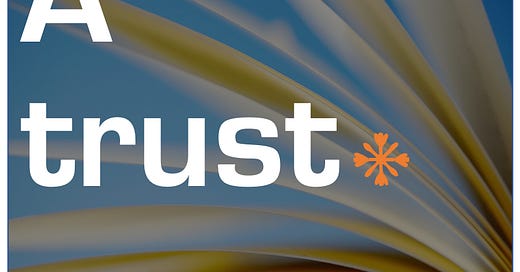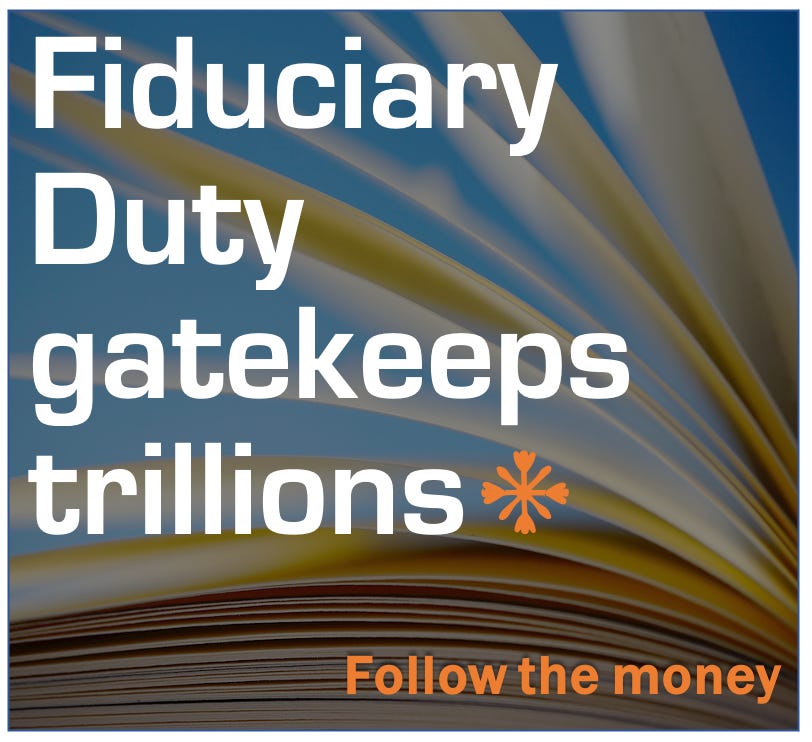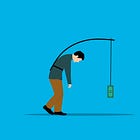You want to sue the world for its betrayal of trust
We have a legal strategy that allows you to do kinda that
Trust, Distrust and A Trust walk into a bar.
Barkeep: “I’ll be damned. I don’t believe it.”
A Trust: “Oh, I’m not with them.”
Back in the dot-bomb days, I worked on the next sure-fire, billion-dollar e-commerce platform. It required a lot of unpaid sweat equity, but the development team was working well as a unit. I mentioned this jolly harmony to a colleague who quipped, “It’s all good until there is money on the table.”
The first round of financing to family and friends proved his point. Money chaos ensued after the first celebratory champagne and the project went nowhere, except embarrassingly dead within weeks if not days. I’m not sure where that money went: there was no agreement in writing nor a handshake. I was young, foolish and mistook mutual back scratching as trust.
That’s how the Weltschmerz sets in: “People are unreliable. They don’t deserve the benefit of the doubt. Trust may not exist, but we sure as hell know distrust is real. The system is screwed.”
I eventually paid Mom back for ponying up the money for a deal that duly disclosed the risk to all of it. That was guilt for trust misplaced.
Recently, I suggested that contradictions are the rule, not the error, in a scarcity-obsessed human society never designed to manage abundance. It’s how Bank of Nature explains the great lengths people go to try to change a system without actually stepping outside the system that fails them. Contradictions are especially relevant in a climate impasse that makes no sense — unless we factor in the emotional turbulance of betrayal that turns everything upside down.
Inevitably, trust is going to hurt. Distrust hurts less, although it blackens everything else. Our Bank of Nature proposal is to step away from that crazy-making trust-distrust hall of mirrors to consider a very different idea with unfortunately confusing nomenclature: A trust.
Distrust manifests by one thing not acting as expected and in spite of vocalized concerns. It’s a trust-rattling battle with the “shoulds”:
The inhuman systems we rely on to organize eight billion actual humans for jobs, food, opportunity and governance should voluntarily self-correct — even without the history to support that certainty.
Right-minded people — in spite of all that complicates their priorities — should harmonically converge in urgent agreement on this one issue. That should mean something yet unknown that should create an undefined benefit.
The decades of good work already done to address the disconnect between what society gives us and what we want instead should be enough. Other ideas that might work differently, ahem, should have spoken up sooner.
Government and industry, despite how they are designed to the contrary, should resolve the climate crisis because it’s the will of the people they are meant to serve.
Ineffective and impoverished civil society should write better government grants and should woo bigger philanthropists and corporate sponsors.
They should but don’t — which is the dissonance in which these worldviews have no currency in the way we run the world. This idealism presumes that society is not working to spec when it is revving as beautifully as the Hummer H2 we drove the climate march. It suggests that society has the capacity to reset when it has operated without an off-switch since it left the factory.
They system is simply unable to embody, reflect or bestow trust.
Bank of Nature says we can work with that limitation.
Textbook “trust the verb” is the act of relying on the character, ability, strength, or truth of someone or something. On the streets, by comparison, modern trust means caution and risk. If it is present, it needs backup.
I trust that the neighbor’s teenager mowing my lawn won’t also take out the new azaleas, but I point them out anyway. Micromanaging.
I trust that my new stove will operate as designed and a warranty will take care of any unanticipated problems. Consumer protection.
I trust that my doctor is giving me the correct diagnosis and, if I need to verify, I can see another expert. Second opinions.
I trust FDA-certified baby formula, but worry about California baby spinach. Buyer beware.
I trust my kid’s Scout leader because I know him personally. Due diligence.
By comparison, “trust the noun” is a safe harbor that can be freed from the realities of paralyzing distrust. “A trust”, says Merriam-Webster, is an actual thing, otherwise known as a property interest held by one person for the benefit of another. It is a list of specific instructions with a very specific type of wiggle-room discretion. One type of “a trust” is a public pension that must adhere to the specific instructions of fiduciary duty in statutes that protect a beneficiary or “promisee.” That document limits the scope of available actions by the fiduciary — which is the person or board with the legal discretion how to use those available actions. Competing priorities not relevant to “a trust” must not affect, diminish, occlude or replace the instructions in a trust document.
Or, shouldn’t. Safety is in the limitations.
Tamar Frankel, the esteemed law professor emerita from Boston University and one of the world’s foremost experts on the powers of fiduciary duty, says it this way:
“If it’s not explicit in the trust document, you can’t do something wonderful.”
Her point is that anything that falls out of the scope of the fiduciary’s limited instructions, including a wonderful thing and not just a bad thing, fails the fiduciary test. One penalty for breach is jail.
I want the wonderful human values of loyalty, care and fairness relevant in the way we run the world. Public pension fiduciary duty, as a legal construct, includes the uncontroversial and uncontested precepts called the Duties of Loyalty, Care and Impartiality. The limiting wiggle room is prudence. Legal imprudence is something I can argue in court.
It is not trivial. Rather, it’s enormous and untapped. That’s the opportunity Bank of Nature is exploring.
Fiduciary duty is “a trust” gatekeeper to tens of trillions of public pension dollars in the current global economy. Bank of Nature argues that fiduciary duty is, at this very moment, deployed in contravention of its own instructions. The damaging result is that trillions (with the mission, duty and scale to lead on climate) are misspent on financings that breach the basics of a fiduciary agreement. Just follow the money.
If we correct that breach for the people owed loyalty, care and impartiality, we can move enough money to curate a better future for all of us.
See? It says right here!
This is where we expect the “A ha!” rather than a “Ho hum!” However, the conflation of trust, distrust and "a trust" is a sticking point that is more trouble than you might think.
I set up a Google Alert for “fiduciary duty”. Every day, I get pings that aggregate online references of the term — which is pertinent only to “a trust” — and they provide a sense of the scope of its use and misuse in regular dealings. Mistaking trust for “a trust” happens with alarming regularity. The effect is that the potency of fiduciary duty is diluted. That weakness in meaning is what gives the status quo a golden pass to continue its non-fiduciary ways.
“Fiduciary duty” has become a popular and official-sounding go-to term for almost any complaint against someone or something where a real or perceived level of trust has failed, even when irrelevant.
Fiduciary duty is not a blanket complaint for every trust infraction. The case for or against a fiduciary duty breach is a technical test for a specific kind of power relationship.
A fiduciary arrangement is set out in black and white either. It’s the epitome of “put it in writing.”
It doesn’t matter if you’re Team Nancy and your fiduciary is Team Tonya. As a beneficiary, it’s not necessary to trust the fiduciary as a person because the language of your agreement is what protects you from an abuse of “trust the verb”.
“A trust” has a job. For public pensions, that job is to be a “forever machine.” The instructions of a public pension reflect that fiduciary responsibility to be, in a very real sense, immortal and able to deliver obligations in the far future. Other types of fiduciary trusts may have other purposes proscribed in their instructions. We say, in our Bank of Nature rationale, that the common practice of managing a public pension fails to follow the instructions designed to fulfill its purpose.
Our Massachusetts Senate Bill 1644 asks legislators to revisit Mass General Laws Chapter 32 to ensure that the law and common practice are in synch. They aren’t — especially if you read the chapter through the lens of the Duty of Impartiality. That’s the fiduciary precept that one type of beneficiary (like young new hires in the civil service) cannot suffer for the benefit of another beneficiary (like current retirees). A narrow implementation of fairness is required, but it isn’t delivered.
Let's sue the bastards!
Zooming out for perspective, Archie Bunker’s curmudgeons club wants to sue the world. The crooks in DC have broken their promises. They do the opposite of what we elect them to do. There is rage for betrayal. Drain the swamp!!
Regardless of the legitimacy of their complaints, the Archies can’t sue the world. It makes no matter if they suffer because of a breach of trust. And, they don’t have “a trust” to fall back on.
The legal mumbo jumbo that says Archie can’t “Sue the Bastards!” involves “standing” (is he a legitimate plaintiff or defendant?) and “harm”, most often financial. Archie has neither, regardless of his righteous indignation. What specific and documented financial loss to Archie is connected to the defendant? Then, who or what is the defendant? Suing the federal government, as in the case of Juliana v United States, went nowhere for the child-plaintiffs because, among other reasons, they couldn’t put a price tag on future loss. It’s a clear example of “trust the verb” being immaterial.
Bank of Nature has identified a plaintiff who meets the legal minimums and has a fiduciary arrangement that guarantees loyalty, care and impartiality. In particular, we want them to argue a breach of the Duty of Impartiality to force a reconciliation of how massive public pension money, consequential to both the economy and environment because of what it finances, curates a safe and secure future through the current choices of financings. Actions and proscribed purpose do not align and that’s the opportunity for change.
Young civil servants (YCSs) in Massachusetts pay 9% of their pay stubs to participate in a $100-billion pension promise managed by government appointees. Of all the people in the world who want to sue the system, these YCSs, with decades to work before retirement, can actually sue the system.
A 9% deduction is a big chunk of change paid into a legally-contracted retirement product that is diminished in value every day by failing to follow the instructions — like Impartiality. It’s a breach of “a trust” that can be argued in court.
This matters because of scale: $5 trillion in the US and $30 trillion globally, which is the scale of the climate crisis. A successful legal challenge by YCSs would force a revisiting of fiduciary instructions and how well the are or are not upheld. It could redirect trillions to fiduciary-grade financings that don’t discount the future, but still meet financial minimums.
YCSs can proceed against a system that has the behemoth financial clout to change the global economy for everyone.
By proxy, Archie can sue the world — and, as we argue, reduce the ill-effects of neoliberalism, dark money, extractive economics and non-fiduciary choices that steal from the future in which YCSs will live. YCSs can free trillions spent against their interests.
Much of climate rage pivots on the moral arguments about what should be done versus what is done instead. Bank of Nature is asking our audiences to consider how "trust the noun" is the legal answer everyone is looking for to correct institutions that are not designed to worry about your hurt feelings but are designed to fulfill a purpose. Public pension fiduciary boards are misfiring based only on their purpose. We can prove that in court based on the tools we have in hand already.
That’s the opportunity to shift the biggest “a trust” in the world toward repairing trust in how we run the world.








